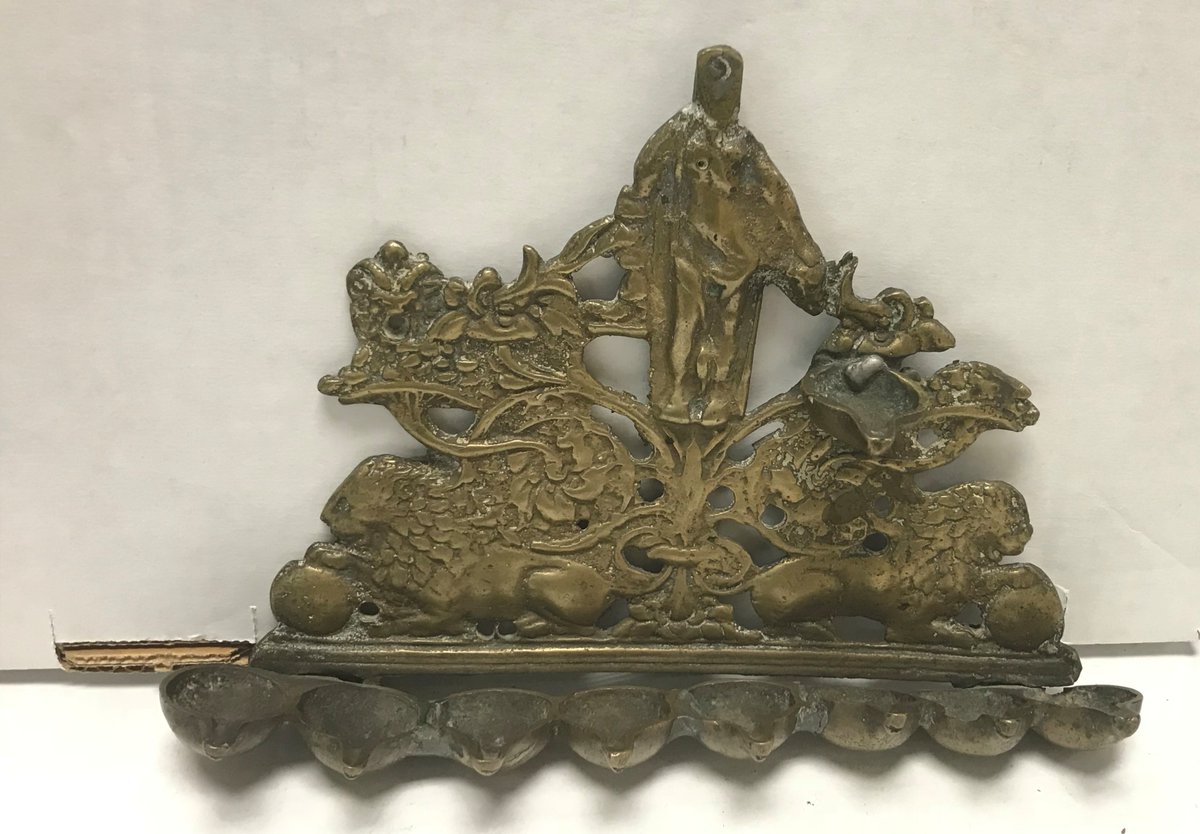okay, I was not aware of the Hanukkah-Judith connection, but a few minutes of googling have brought me to the realization that it is very much A Thing and I have images to share (this August Riedel painting is only here so the first tweet has an image): 

Okay, so first we have this image I already retweeted of a 19th century Italian hanukkiah, from the Jewish Museum, with a gloriously tits-out Judith brandishing Holofernes's head and standing atop two lions 11/10 need a replica 

Here's an 18th century one from the Eldridge Street Museum.
4/10--not really comfortable with the halo, not enough knives, but the cherubim are fun
4/10--not really comfortable with the halo, not enough knives, but the cherubim are fun

Then there's this one--unfortunately blurry, doesn't appear to have knives, but the lions are solid, 3/10 

This one was apparently for sale on Etsy at one point, according to Pinterest. Points off for lack of lions, but I'm upping the score in appreciation of both the GIANT KNIFE and the general bling-i-ness of making it mirrored.
8/10
8/10

This next entry is subtle. No lions, no flashy head-brandishing, just Judith lighting a lamp and--oh, WHAT'S THIS? her maidservant just nonchalantly putting away a head and a sword?
Sometimes subtle is COMPLETELY METAL, Y'ALL.
9/10
Sometimes subtle is COMPLETELY METAL, Y'ALL.
9/10

Then there's this one, which has a small image of Judith and her maidservant slipping the head into a bag on its back panel.
2/10, focuses too much on some dude
2/10, focuses too much on some dude

Bonus! Art deco "Judith, Queen of the Menorah" card:
9/10 glorious Art Nouveau dress, GIANT sword, very sad Holoferness, could use a lion or two but all in all a worthy endeavor
9/10 glorious Art Nouveau dress, GIANT sword, very sad Holoferness, could use a lion or two but all in all a worthy endeavor

And this gloriousness, that I don't even know how to rate:
https://twitter.com/onthemainline/status/1465385291259203594
Also I would like to recommend this article, which points out the important role of cheese in the Judith story--our girl gets Holofernes drunk by serving him cheese so he gets thirsty (buy with bread, sell with cheese, friends).
miriamfeinbergvamosh.com/judith-hanukka…
miriamfeinbergvamosh.com/judith-hanukka…
Okay, and talk about traditions that need to be more widely adopted:
"We’re told that in some North African Jewish communities the seventh night of Chanukah became known as Chag Habanot, the Festival of the Daughters, celebrated by women with a cheese-centered feast."
"We’re told that in some North African Jewish communities the seventh night of Chanukah became known as Chag Habanot, the Festival of the Daughters, celebrated by women with a cheese-centered feast."
anyway, CLEARLY the 7th night of Hanukkah is for fried cheese curds, or paneer pakora, or mozarella sticks
The end.
The end.
• • •
Missing some Tweet in this thread? You can try to
force a refresh




